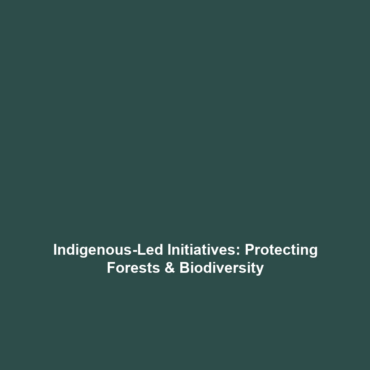Indigenous-Led Efforts to Protect Forests and Biodiversity
Introduction
Indigenous communities worldwide play a crucial role in conserving forests and biodiversity. Case studies of indigenous-led efforts to protect forests and biodiversity, particularly among Amazonian tribes and groups in Papua New Guinea, highlight their significance in combating deforestation and biodiversity loss. These initiatives not only reflect the depth of indigenous knowledge but also illustrate effective strategies for sustainable environmental stewardship. As deforestation continues to pose a dire threat to ecosystems globally, understanding these efforts can inspire broader environmental policies that recognize and empower indigenous rights.
Key Concepts
Indigenous Knowledge and Forest Stewardship
Indigenous cultures have developed intricate connections with their surrounding ecosystems, often managing their resources through traditional ecological knowledge. Concepts such as sustainable land use, biodiversity stewardship, and participatory approaches form the backbone of many successful conservation initiatives. Among the Amazonian tribes, for example, community-led practices have demonstrated effectiveness in maintaining biodiversity while simultaneously providing for their livelihoods.
Traditional Ecological Knowledge (TEK)
TEK encompasses the practices and beliefs that indigenous peoples have accumulated over generations. This knowledge is invaluable in identifying and conserving local plant and animal species, making it integral to any discussion on deforestation and biodiversity loss. By integrating TEK with modern conservation strategies, organizations can enhance biodiversity protection efforts.
Applications and Real-World Uses
Case studies of indigenous-led efforts to protect forests and biodiversity offer compelling applications in the fight against deforestation and biodiversity loss. Here are some noteworthy examples:
- Amazonian Tribes: Initiatives like the Kayapo and Yanomami tribes have successfully navigated land-use conflicts to protect their territories from illegal logging and mining activities.
- Papua New Guinea: In Papua New Guinea, local tribes utilize customary land management practices that preserve biodiversity by regulating hunting and harvesting of natural resources.
These applications demonstrate how indigenous-led conservation models can be effectively integrated into broader environmental governance frameworks.
Current Challenges
While the importance of indigenous-led conservation efforts is clear, several challenges hinder their full implementation:
- Political Opposition: Governments may resist recognizing indigenous land rights, leading to conflicts over land use.
- Lack of Funding: Many indigenous initiatives struggle to secure financial resources to support their conservation efforts.
- Climate Change Impacts: Ongoing climate change threatens the ecosystems that indigenous communities rely on for survival and biodiversity.
Future Research and Innovations
Future research and innovations in the field of indigenous-led efforts to protect forests and biodiversity are essential to overcoming current challenges. Upcoming areas of focus include:
- Utilization of New Technologies: Breakthroughs in satellite monitoring and data analysis can enhance the tracking of deforestation and enable more targeted conservation strategies.
- Collaborative Research Initiatives: Partnerships between indigenous groups, scientists, and conservation organizations can foster effective co-management of forest resources.
Conclusion
Case studies of indigenous-led efforts to protect forests and biodiversity, notably from Amazonian tribes and Papua New Guinea, represent a critical aspect of addressing the ongoing crisis of deforestation and biodiversity loss. Acknowledging the value of Indigenous knowledge in conservation strategies not only enriches scientific understanding but also reinforces the need for policies that empower these communities. To learn more about how these efforts are shaping environmental protection, explore our resources on indigenous rights and biodiversity conservation.
